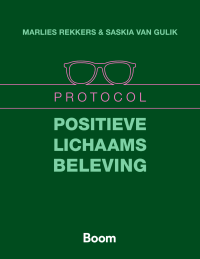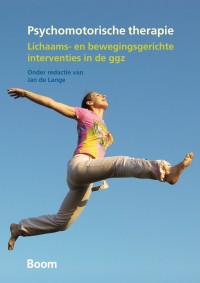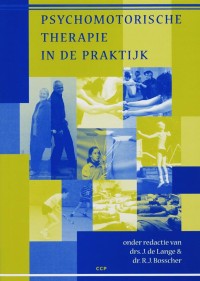Psychomotor interventions for mental health - Adults
A movement- and body-oriented approach
Psychomotor interventions for mental health
Psychomotor interventions for mental health – Adults beschrijft de behandeling van volwassenen met psychische klachten c.q. psychiatrische aandoeningen, waarbij de focus ligt op de lichaamsbeleving en/of het bewegingsgedrag. Het boek behandelt de psychomotorische therapie zoals aangeboden in onder meer de curatieve en langdurige ggz, de forensische psychiatrie, de revalidatie en de ambulante praktijk. In ieder hoofdstuk geven de auteurs bij een specifieke (doel)groep theorie en praktijk geïntegreerd weer. Hierbij wordt ook ingegaan op de resultaten van wetenschappelijke onderzoek rondom evidentie en werkingsmechanismen.
Door de professionalisering van de beroepsgroep en de internationale positionering van het vakgebied, de opleidingen en het wetenschappelijk onderzoek is er voor gekozen het boek in het Engels te publiceren. Dit maakt Psychomotor interventions for mental health – Adults geschikt voor zowel Nederlandse als internationale professionals (in opleiding).
English description of Psychomotor interventions for mental health
Psychomotor interventions for mental health - Adults describes the treatment of adults with psychological complaints and/or psychiatric disorders, with a focus on body awareness and/or movement behavior. The book deals with psychomotor therapy as provided in curative and long-term mental health care, forensic psychiatry, rehabilitation and outpatient practice. In each chapter the authors present theory and practice in an integrated manner for a specific group. The results of scientific research on evidence and mechanisms of action are examined.
Due to the professionalization of the profession and the international positioning of the discipline, the study programs and scientific research, it was decided to publish the book in English. This makes Psychomotor interventions for mental health - Adults suitable for both Dutch and international professionals (in training).
Inhoud
General introduction
Claudia Emck
1 Psychomotor interventions for mental health: an introduction
Claudia Emck & Mia Scheffers
1.1 Psychomotor therapy and its place in mental health
1.2 Physical education as a pillar of PMT
1.3 Body-oriented approaches to psychotherapy
1.4 Movement- and body-oriented approaches: together or apart?
1.5 Two pillars, more to go?
1.6 Psychomotor diagnostics: the value of movement and bodybased information for treatment and development
1.7 Interventions: from mono- to multi-method practices
1.8 Integration: current clinical theories and practices
1.9 Current topics and future development
2 Psychomotor interventions for depressive disorders
Jooske T. van Busschbach, Marco Bluming & Thomas W. Scheewe
2.1 General characteristics and psychopathology
2.2 Movement behaviour and body experience in depression
2.3 Diagnostic and evaluative instruments
2.4 Treatment
2.5 Conclusion
3 Psychomotor interventions for anxiety disorders
Olivier Glas & Els Moeke-Murris
3.1 General characteristics
3.2 Movement behaviour and body experience
3.3 Theoretical principles for treatment
3.4 Modifying emotion-driven behaviour
3.5 Conclusion
4 Psychomotor interventions for somatic symptom related disorders
Lia C.C. van der Maas & Brechje C. Tijssen
4.1 General characteristics
4.2 Diagnostic procedures
4.3 Treatment
4.4 Social factors
4.5 Current treatment and interventions
4.6 Psychomotor therapy
4.7 Attitude of therapist
4.8 Evaluation
4.9 Conclusion
5 Psychomotor interventions for eating disorders
Marlies E. Rekkers, Cees Boerhout, Aurélie M. Nieuwenhuijse & José P. Bonekamp
5.1 General characteristics and psychopathology
5.2 From body image to body experience
5.3 Emotion recognition and regulation
5.4 Exercise behaviour
5.5 Conclusion
6 Psychomotor interventions for post-traumatic stress disorder and dissociative disorders
Minke M. van de Kamp & Marieke Hoven
6.1 General characteristics and psychopathology
6.2 Body experience, movement behaviour and diagnostics for
psychomotor therapy
6.3 Treatment
6.4 Current psychomotor interventions: consensus- or evidence-based guidelines and protocols
6.5 Conclusion
7 Psychomotor interventions for psychotic disorders
Thomas W. Scheewe, Jeroen Deenik, Bertine de Vries, Paulien van Vilsteren & Davy
Vancampfort
7.1 General characteristics and psychopathology
7.2 Specific diagnostics and observation for psychomotor therapy
7.3 Psychomotor therapy
7.4 Conclusion
8 Psychomotor interventions in acute psychiatric wards
Minke M. van de Kamp, Yudith R. Haveman & Claudia Emck
8.1 General characteristics and psychopathology
8.2 Movement behaviour and body experience
8.3 Treatment
8.4 Conclusion
9 Psychomotor interventions for personality disorders
Ad A. Drewes, Moeneke N. Nijkamp & Minne W. Roemen-van Haaren
9.1 Classification and the DSM-5
9.2 Prevalence and co-morbidity
9.3 Aetiology
9.4 General aspects of therapy
9.5 Psychomotor therapy
9.6 Summary and conclusion
10 Psychomotor interventions for disruptive, impulse-control and conduct disorders: why aggression requires an experience-based treatment approach
Moeneke N. Nijkamp & Frederik de Pauw
10.1 General characteristics of aggression
10.2 Forensic psychiatry
10.3 Treatment
10.4 Inputs
10.5 Routes
10.6 Outcomes
10.7 Summary and conclusion
11 Psychomotor interventions for people with substance use disorders
Leon Stoffels, Jooske T. van Busschbach, Krista van Berkel, Jan de Lange & Hein de Haan
11.1 Characteristics of addiction to substances
11.2 Prevalence
11.3 Co-morbid disorders
11.4 Different groups of substances with different effects
11.5 Body experience and movement behaviour in individuals with substance use disorder
11.6 Addiction and movement behaviour
11.7 Aetiology of addiction to substances
11.8 Treatment of addiction to substances
11.9 Psychomotor therapy
11.10 Evidence-based psychomotor interventions
11.11 Conclusion
12 Psychomotor interventions for older adults with dementia
Patty van ‘t Hooft, Renske Bouman & Luke Faasen
12.1 Mental health disorders in older adults
12.2 Dementia: general characteristics
12.3 Movement behaviour and body experience in older adults with dementia
12.4 Treatment
12.5 PMT
12.6 Psychomotor treatment of dementia from a neuropsychological perspective
12.7 Conclusion
References
Index
About the authors






